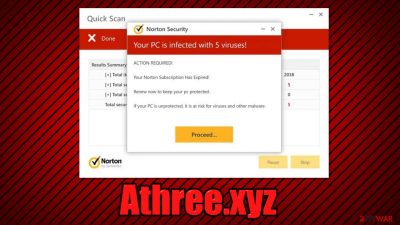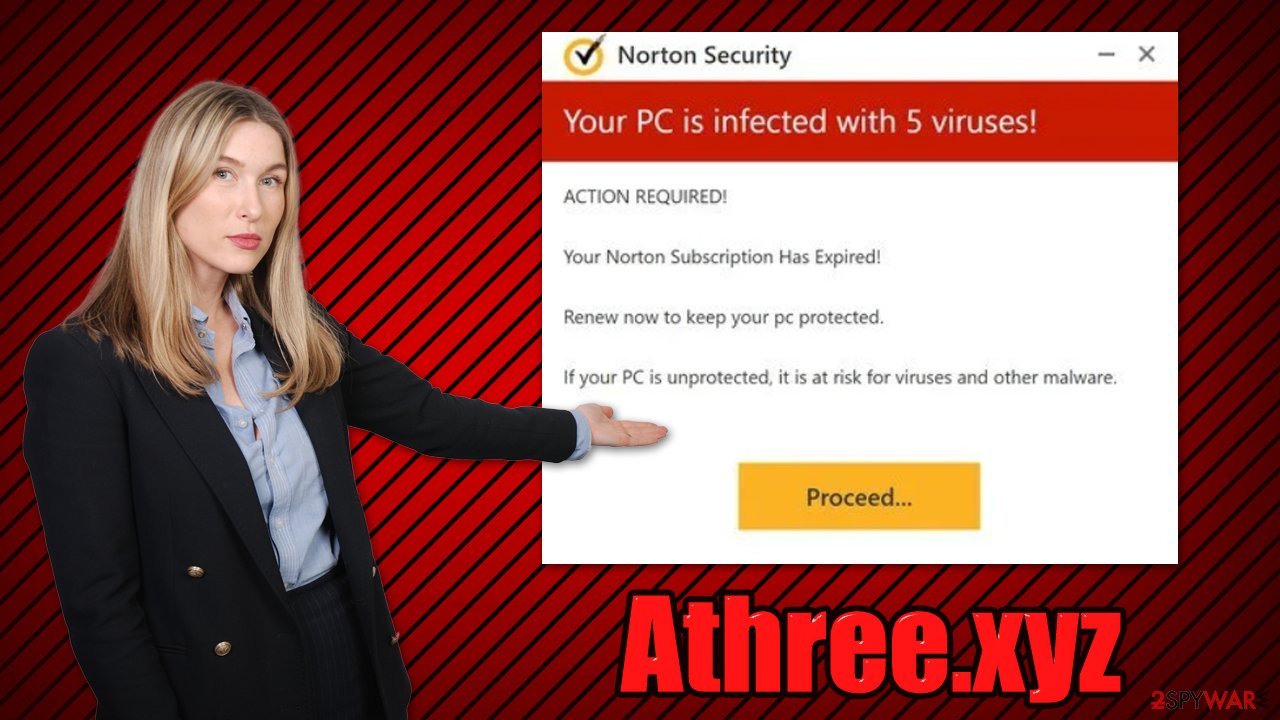Athree.xyz ads (scam) - Free Instructions
Athree.xyz ads Removal Guide
What is Athree.xyz ads?
Athree.xyz shows fake virus infection alerts to make people purchase software

Athree.xyz is a website of dubious nature. In most cases, people do not enter it randomly – the redirect to it occurs whenever they click a booby-trapped link on some high-risk website. Torrents, software cracks, and similar dangerous sites are well-known for their ability to reroute visitors to other malicious places and host malware.
Created by scammers, Athree.xyz shows what looks to be a full system scan with security software right after entering. In fact, it may seem legitimate because a prominent security vendor known as Norton name is used. The security provider has nothing to do with this, and you shouldn't let yourself get tricked by scammers.
Soon after the alleged system scan, users are presented with fake results, which have nothing to do with the real state of their system's security. All visitors always receive the exact same result, which claims the following:
Your PC is infected with 5 viruses!
ACTION REQUIRED
Your Norton Subscription Has Expired!
Renew now to keep your PC protected.
If your PC is unprotected, it is at risk for viruses and other malware.
The misleading message says that the security software subscription has expired and that it needs to be renewed in order to remove the alleged viruses from the system. Those who proceed might be redirected to malicious websites and be prompted to download insecure software.
Besides pushing a possibly fake version of security software, Athree.xyz also asks visitors to enable push notifications. If the “Allow” button is clicked – whether intentionally or not – the affected users would start seeing intrusive pop-ups on a regular basis. We will teach you how to get rid of these annoying push notifications easily, just scroll down for details.
| Name | Athree.xyz |
| Type | Scam, phishing, redirect, adware |
| Operation | Claims that viruses have been found and that the anti-malware software license has expired. Asks to upgrade fake license |
| Distribution | Redirects from other malicious websites, adware |
| Risks | Installation of PUPs or malware, sensitive information disclosure, financial losses |
| Removal | Do not interact with links or other content of a scam site. Instead, check your system with SpyHunter 5Combo Cleaner security software |
| Other tips | Third parties can employ cookies to continue tracking your online activities, so we recommended clearing browser caches and other leftover PUP files with FortectIntego |
Do not worry, Athree.xyz scan results are fake. You should still practice caution
There are several reactions one can expect after accessing a scam website – some users might believe the message, others can immediately see the deception, while some groups of people would be not quite sure what to think about it all.
Those who realize that message itself is fake still often have doubts about whether their systems were infected due to accessing the Athree.xyz scam site. The truth is, this scenario is hardly possible unless a software vulnerability[1] is present on your system, and the page would host the exploit kit[2] to perform malicious actions. To mitigate this rather alarming infection method, we recommend you ensure that all your software is fully updated with security patches.
It is noteworthy that there are thousands of websites that pus fake scan results allegedly coming from Norton or McAfee security vendors – Defenderlab.xyz, Safetyremind.xyz, and Esoftwareplus.online are just a few examples we already covered before.

If ads and redirects do not stop…
Adware[3] could be one of the most common reasons why users encounter suspicious content while browsing the web. Intrusive ads, unexpected homepage/new tab changes, and similar suspicious activities can also be one of the signs of infection. It is important not to ignore these symptoms, as further infection and damaging consequences are almost inevitable over time.
To remove adware and malware quickly and easily, stopping all the redirects to Athree.xyz and similar websites, you should perform a full system scan with security software, such as SpyHunter 5Combo Cleaner or Malwarebytes. Unlike fake scans generated via a fake website, these tools are actually capable of finding and removing all the malicious components at once.
We always recommend users who suffer from unwanted browser behavior ensure that browser caches and other web data are appropriately eliminated. While this can be done by resetting the browser, it is usually unnecessary. Instead, we recommend using the FortectIntego maintenance tool or performing the job manually:
Google Chrome
- Click on Menu and pick Settings.
- Under Privacy and security, select Clear browsing data.
- Select Browsing history, Cookies and other site data, as well as Cached images and files.
- Click Clear data.
![Clear cache and web data from Chrome Clear cache and web data from Chrome]()
Mozilla Firefox
- Click Menu and pick Options.
- Go to Privacy & Security section.
- Scroll down to locate Cookies and Site Data.
- Click on Clear Data…
- Select Cookies and Site Data, as well as Cached Web Content, and press Clear.
![Clear cookies and site data from Firefox Clear cookies and site data from Firefox]()
MS Edge (Chromium)
- Click on Menu and go to Settings.
- Select Privacy and services.
- Under Clear browsing data, pick Choose what to clear.
- Under Time range, pick All time.
- Select Clear now.
![Clear browser data from Chroum Edge Clear browser data from Chroum Edge]()
Safari
- Click Safari > Clear History…
- From the drop-down menu under Clear, pick all history.
- Confirm with Clear History.
![Clear cookies and website data from Safari Clear cookies and website data from Safari]()
If you have enabled push notifications
As mentioned earlier, Athree.xyz always asks whether push notifications should be enabled. This allows that particular website to send any kind of information directly to users' desktops. The unfortunate side effect is that malicious websites tend to show malicious ads and include dangerous links within push notifications accepted by the users. To remediate this situation, you can simply block the site from sending you notifications via browser settings:
Google Chrome
- Open the Google Chrome browser and go to Menu > Settings.
- Scroll down and click on Advanced.
- Locate the Privacy and security section and pick Site Settings > Notifications.
- Look at the Allow section and look for a suspicious URL.
- Click the three vertical dots next to it and pick Block. This should remove unwanted notifications from Google Chrome.
![Stop notifications on Chrome PC 2 Stop notifications on Chrome PC 2]()
Mozilla Firefox
- Open Mozilla Firefox and go to Menu > Options.
- Click on Privacy & Security section.
- Under Permissions, you should be able to see Notifications. Click the Settings button next to it.
- In the Settings – Notification Permissions window, click on the URL's drop-down menu.
- Select Block and then click on Save Changes. This should remove unwanted notifications from Mozilla Firefox.
![Stop notifications on Mozilla Firefox 2 Stop notifications on Mozilla Firefox 2]()
Safari
- Click on Safari > Preferences…
- Go to the Websites tab and, under General, select Notifications.
- Select the web address in question, click the drop-down menu and select Deny.
![Stop notifications on Safari Stop notifications on Safari]()
MS Edge (Chromium)
- Open Microsoft Edge, and go to Settings.
- Select Site permissions.
- Go to Notifications on the right.
- Under Allow, you will find the unwanted entry.
- Click on More actions and select Block.
![Stop notifications on Edge Chromium Stop notifications on Edge Chromium]()
How to prevent from getting adware
Access your website securely from any location
When you work on the domain, site, blog, or different project that requires constant management, content creation, or coding, you may need to connect to the server and content management service more often. The best solution for creating a tighter network could be a dedicated/fixed IP address.
If you make your IP address static and set to your device, you can connect to the CMS from any location and do not create any additional issues for the server or network manager that needs to monitor connections and activities. VPN software providers like Private Internet Access can help you with such settings and offer the option to control the online reputation and manage projects easily from any part of the world.
Recover files after data-affecting malware attacks
While much of the data can be accidentally deleted due to various reasons, malware is one of the main culprits that can cause loss of pictures, documents, videos, and other important files. More serious malware infections lead to significant data loss when your documents, system files, and images get encrypted. In particular, ransomware is is a type of malware that focuses on such functions, so your files become useless without an ability to access them.
Even though there is little to no possibility to recover after file-locking threats, some applications have features for data recovery in the system. In some cases, Data Recovery Pro can also help to recover at least some portion of your data after data-locking virus infection or general cyber infection.
- ^ Thomas Holt. What Are Software Vulnerabilities, and Why Are There So Many of Them?. Scientific American. Science Magazine.
- ^ Exploit kit. Wikipedia. The free encyclopedia.
- ^ Will Kenton. Adware. Investopedia. Source of financial content on the web.








